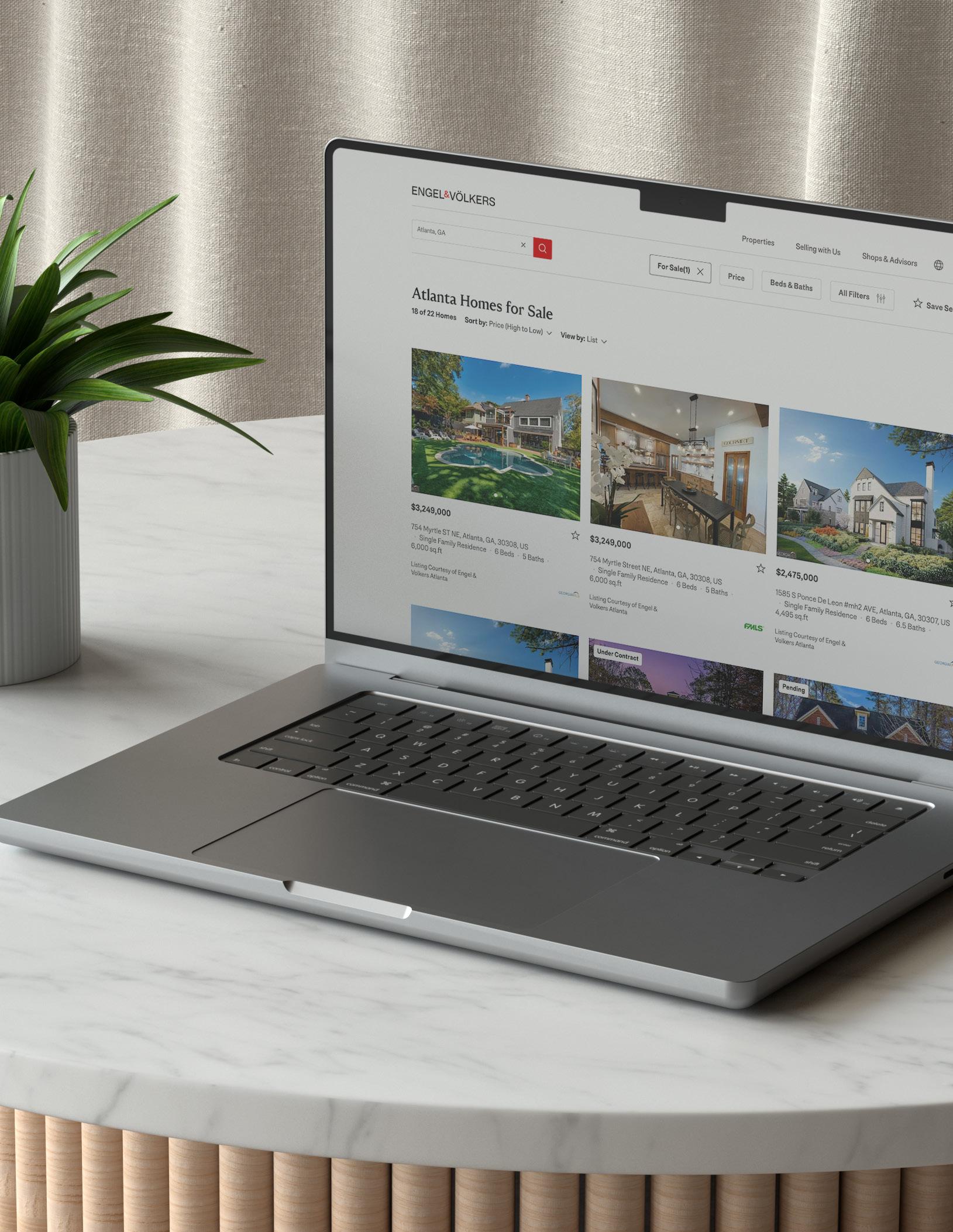
Engel & Völkers · Seller’s Guide

Here's to finding a buyer that loves your home


Engel & Völkers · Seller’s Guide

Here's to finding a buyer that loves your home
Our homes are filled with memories, and they serve as the backdrop of the families you’ve built and moments you cherish. They are also oftentimes the largest asset you own. Place full confidence in your Engel & Völkers Advisor to help you maximize your return while sourcing the perfect buyer to preserve the legacy of your home’s stories as you embark on the next chapter of your journey.



At Engel & Völkers, we understand that real estate is more than just a transaction. It’s a way of life that enables you to make the most of every moment. You’re in good hands. Engel & Völkers ·

Taking the Necessary Steps
Selling your property for the highest price possible can have a significant impact on your future, including your ability to purchase your next home. The process can be an enjoyable one with a little preparation.
01 Start the Process Early
Selling your home requires you to shift your perspective from that of a “homeowner” to a “home seller.” You’ll need to start thinking objectively and understand that you are selling a product. Sometimes it helps the mindset shift to start the process early.
02 Find a REALTOR® You Can Trust
Who you choose to partner with is one of the most important decisions you’ll make when selling your home, so finding the right person is essential. They are responsible for aggressively marketing your home, equipping you with the knowledge you need to make informed decisions, negotiating your deal, and guarding your interests.
03 Understand the Costs
There are costs associated with selling your house including compensation to the real estate Advisor involved, costs associated with negotiating the sale, and any costs you may incur to fix issues that could come up during a home inspection.
04 Complete Those Side Projects
First impressions matter – especially to prospective home buyers. The seemingly small issues with your home like loose doorknobs, broken screen doors, and faulty drains will lead buyers to assume that disrepair carries over to larger items as well, so get them squared away before going to market.
05
De-Clutter and Neutralize

06 Price Your Home to Sell
Your personal preferences need to take a back seat for a bit while you “stage” your home to win over buyers. Clean up by renting a storage unit for knick-knacks, photos, extra furniture and other personal items. When showing the home, fill it with inviting smells by putting out fresh flowers or baking cookies.
Selling your home for more than you bought it for is every homeowner’s dream, but it’s not a given. How much your home is worth and will actually sell for depends on the current market – not the price you paid for it or how big you’d like the return to be.
07 Invest in a Pre-List Inspection
A pre-inspection demonstrates a willingness to go beyond what’s expected, which sets you apart from other sellers. You’re sending a signal that your house is an “open book.” It can save you money in the long run, and it gives you a heads-up if there are problems that a potential buyer will likely want repaired.
08 Prepare for Any & All Offers
Any offer is a good offer because it shows interest and allows your Advisor to have a meaningful discussion about the value of your home. Generating offers early in the process is a good thing, and pricing your home based on the market will effectively draw multiple prospects.
09
Get Out of the House
Staying out of the house during showings and open houses is best for everyone. Prospective buyers are evaluating your home as a potential investment, and they’ll feel more comfortable exploring, speaking openly, and visualizing their life in the home without the seller hanging over their shoulder.
10
Let Your Advisor Do Their Job
You hired your Advisor for their expertise and knowledge. Share your goals with them, and then trust them to get the job done. If you can support their strategy, have realistic expectations, and focus your emotional energy on finding your next dream home, you’ll experience much less stress and hopefully find joy in the entire process.
You hired a Real Estate Advisor for a reason. Their industryexpertise , knowledge about your niche market, and their yearsofexperience in positioning a home sale for success, is why you should trust that they have yourbestinterestsinmind.


Assessing Your Home's Value
A Market-Oriented Valuation performed by your Engel & Völkers Advisor is an essential part of the services we provide. It is the most accurate assessment of your home’s value based on data and information that includes current and historical real estate activity in your market.



Accurate pricing based on a comparative market analysis is crucial for maximizing the value of your home sale. Pricing slightly above market value can deter potential buyers, while starting with the right price ensures optimal results.
As time on the market increases, interest diminishes, emphasizing the importance of a swift and informed approach. Understanding local market dynamics is key to gauging buyer perception and facilitating successful negotiations. Although home improvements may not directly translate to increased value, a well-priced property can still attract competitive offers. Negotiating offers lower than the listing price is common, but it signifies buyer interest and presents opportunities for favorable outcomes.
Ultimately, effective pricing from the outset is fundamental, as it determines the level of market attention and the likelihood of finding the right buyer, which your expert advisor will accurately assess and provide you prior to listing your home.

The market value of your property is determined exactly the same way as any other commodity – what a buyer is willing to pay for it in today’s market. Despite the price you paid originally, or the value of any improvements you may have made, the value is determined by market forces.












Strategy and Promotion for Your Listing
With a full understanding of your home’s position in the market and a pricing strategy to meet your goal within an acceptable timeframe, our marketing team will go to work developing and executing a custom strategy to promote your home to its target audiences.

From professional photographers who capture images of your home that will leap out of the pages of worldclass publications where Engel & Völkers ads are placed, to our designers and copywriters who work together to build your campaigns which may include direct mail, online advertising, social media posts, and exposés, our full-service marketing approach includes professional and high-quality creative work that places you in front of the most qualified buyers. Our services include but are not limited to the following:
• Targeted Print & Digital Outreach
• Social Media Campaigns
• 3D Matterport Tours
• Network of Online Partnerships
• GG Magazine Exclusive Features
• Photography & Videography
• Global Shop TV Features

Our relationships with the world’s leading publications, local magazines, newspapers and our ongoing public relations activities ensure all around maximum exposure for our listings in print. Engel & Völkers has maintained special arrangements for years that allow our properties heightened exposure in local, national and international print publications.
Our team executes based on a thoughtful marketing approach, which is custom-tailored for each unique client and each unique property. We ensure your property has online exposure in all major markets, which is imperative for selling property to today’s digital-savvy and often international clientele.





What to Expect During Showings
Now that you’ve scrutinized, staged, and scrubbed down your property, the showings will begin. While your property may be in immaculate shape, it is important to follow some unwritten etiquette rules to show your home in the best possible light.
01 Types of Showings
Sometimes agents make showings by appointment and other times a lockbox will be placed on your house. Through a lockbox, your Advisor will electronically receive information about who is showing your property, when, and any additional contact information associated with the showing.
02 Leave During Showings
Buyers are less comfortable when homeowners, and their pets, are watching their every move. They are trying to picture themselves living in your property, so it is important that you give them privacy to experience your house without you or your pet in their space.
03 Move Your Car(s)
Make it easy for visitors to park and view the home. No one likes parking issues, and a potential buyer having parking issues during a showing is a sure way to get a viewing off to a bad start. Either park your spare car in the garage or take it with you on your way out.
04
Lay Out Important Documents
If questions arise while buyers are on the premises, it may help them decide to put in an offer that much faster if they can find answers quickly and in writing. Leave out the home inspection report, appraisal, home warranty, etc. so that people considering your home can review.
05 Offer Refreshments

06 Be Patient Waiting for Feedback
Putting out a few bottled waters in a small bowl of ice is always appreciated, along with some light, easy, grab-and-go refreshments like mints or cookies. Your advisor will take care of all of the hospitality, but you’re welcome to put your personal touch on it.
Patience is key as you await feedback from recent tours; every response is a step closer to finding the perfect match for your property. Remember, the right buyer may just be taking their time to ensure they’ve found their ideal home.
07 Lock Up Valuables
Although buyers will be accompanied by real estate agents, it is still best to protect your valuables by locking them up safely. This includes jewelry, credit cards, money, and checks and is especially important during open houses. It’s nothing you need to stress over - something to simply keep in mind.
08 Prepare for No-Shows
Unfortunately, there will be times when buyers schedule a showing and do not show up. There could be many reasons for a “no-show”. Keep an open mind, and remember sometimes unexpected things come up. There will be other opportunities to reschedule or invite alternative prospects to visit.

What to Expect From Offer to Closing
Coming to an agreement on price and terms between the seller and the buyer is the first step. Between offers and counter-offers, you will come to a mutually agreed upon terms, and the listing status of your home will change from ”active” to “pending”. Here are a few nuances to expect before you can officially make it to closing day.

The Binding Agreement Date is the day on which all of the timelines and deadlines for the contract contingencies begin, such as the due diligence period, the financing contingency period, and the appraisal contingency period.
The Georgia residential Purchase and Sale Agreement is a contract that legally binds two parties (seller and buyer) together for the purpose of making a transaction of a residential property. This contract covers all the pertinent information regarding the transaction including price, financing terms, rights and obligations of both parties, and a closing clause.

Earnest Money
Earnest Money is a deposit made to a seller indicating the buyer’s good faith in the purchase and is typically 1-3% of the purchase price. The earnest money paid is put toward the buyer’s down payment when the transaction is finalized.
The buyer may elect to perform inspections on the property as part of the Due Diligence period defined in the contract. These inspections must be completed by a number of days specified under “buyer’s right to terminate” in the standard purchase and sale agreement contract.
A home appraisal is an unbiased estimate of the true (or fair market) value of what a home is worth, which are ordered during the mortgage loan process so that there is an objective way to assess the home’s market value. If the appraisal is lower than the contracted price, most lenders will decline to offer the buyer a loan. In this instance your Advisor will help facilitate additional negotiations between buyer and seller.

Common Issues to Assess Ahead of Time
As a component of the Purchase and Sale Agreement, a Buyer has the right to inspect your property during their due diligence. Identifying any items that need repairs prior to a Buyer discovering them better positions you to deal with possible negotiations that may arise after the initial contract has been negotiated.
Worn or outdated systems and homeowner additions are the most common defects, especially in older homes. Electrical system problems require immediate attention.
Poor insulation and poor ventilation in attics and walls will cause excessive utility costs, potential moisture issues, and lack of occupant comfort.
Cut and broken trusses are often seen in attic cavities, and on occasion we see structural components missing. Usually repairs are needed, however we find it is rarely an imminent safety hazard.
Improperly installed or aged roofing surfaces are common. Repairs may be simple, or the entire roof may need to be replaced. Consult a roofer for a full assessment.
Deferred maintenance represents a potential highcost situation to bring the home back into condition. If the homeowner did not properly care for the home, someone will need to later.
Signs of mold growth represents the latest environmental scare. Structure cracks and separations at windows can allow water into the home’s wall cavities.
Improper installations, inadequate maintenance, and aged components are common. Thoroughly assess with a trained professional.
Water needs to drain away from the structure at its perimeter to prevent water intrusion. Roof gutters and downspouts can sometimes be added to rectify site drainage problems.
The most common defects are leaking, outdated, or problematic systems such as polybutylene. Repairs can be made, but on occasion it may require a total system replacement.

During a home inspection, several common issues may arise that merit attention and remediation to ensure the integrity and safety of the property. Addressing these issues promptly can help prevent potential problems down the line and maintain the value of the home.
Termites, often unseen until they inflict considerable structural harm, can lead to expensive repairs. While not mandated by law in Georgia, buyers frequently seek termite letters to safeguard against these pests, while investing in preventive measures such as termite bonds can offer lasting defense against potential damage.
Homes constructed before 1978 often harbor lead-based paint, a known cause of lead poisoning, particularly when the paint begins to deteriorate. While intact lead paint usually poses minimal risk, deteriorating surfaces, especially those accessible to children, can become hazardous, emphasizing the importance of regular maintenance, dust cleanup, and precautions during renovation or painting to mitigate the spread of toxic lead dust.
Polybutylene piping, favored from 1978 to 1995 for its affordability and ease of installation, is recognizable by its blue, gray, or black hue and 1/2” or 1” diameter, but may degrade over time due to water supply oxidants, resulting in leaks and potential structural harm. Despite minimal maintenance requirements, joint leaks are frequent, often requiring complete pipe replacement.
Stucco
Stucco siding, crafted from cement, water, and sand, is prone to cracking, particularly in regions with clay-rich soil prone to foundation shifts. While minor cracks can be easily fixed, wider ones may signify water penetration and structural concerns, potentially necessitating professional repair or replacement by a qualified contractor over time.
Radon, a colorless and odorless radioactive gas generated by decaying uranium, pervades nearly all soils and poses a threat when trapped inside homes. Long-term exposure to elevated levels increases the risk of lung cancer, with seepage through concrete gaps in walls and floors presenting significant concerns. Given the absence of immediate symptoms, testing is crucial, as nationwide surveys reveal elevated radon levels affecting up to 1 in 5 homes.
Mold thrives in moist environments, often present in basements, with extensive growth potentially indicating past flooding. Testing and remediation for significant mold growth are essential, but addressing the issue is typically more manageable and affordable than anticipated.

What Comes Next
Closing Day is the day that the buyer and seller fulfill all of the agreements made in the sales contract. In more literal terms, it is about the transfer of money and documents so that you, the seller, can transfer ownership and possession of the property free and clear to the buyer. Here’s what you can expect.

On the day of closing, you and the buyer sign various documents including the deed that will be filed at the county courthouse. All financial obligations, including agent commissions, mortgage payoffs, and down payments, are settled, and you’ll receive any proceeds due. The buyer receives keys, garage door remotes, and possibly receipts for agreedupon work, while it’s important to leave warranty and instruction books for appliances and systems for the new owner.
In Georgia, closings are handled by attorneys. In a cash purchase, the attorney represents the Buyer. When the Buyer is obtaining a loan, the attorney represents the lender. To avoid conflict, the attorney handling the closing may not represent any other parties of the transaction. If the Buyer/Borrower wants legal representation, they would need to hire independent counsel.
• Maintain the house in good condition
• Negotiate and perhaps repair something the buyer’s inspector finds
• Notify your utility companies of a final service date
• Prepare to Move
What the seller pays at closing depends partly on local law and practice, and partly on the terms negotiated in the sales contract. Just remember that the contract rules. You can’t decide you don’t want to pay something that was already agreed to by both parties and written in your contract — unless you can get your buyer to agree. Of course, that means amending the paperwork, which could mean delaying the closing. Some expenses may include:
• Real Estate Agent Compensation
• Prorated Property Taxes
• Any Outstanding Mortgage Balances
• Attorney Fees
• Title Insurance Premiums
• Recording Fees for Transferring the Deed
• Any agreed-upon closing costs
The deed to your home, if the home is paid off and has no mortgage or liens
Photo ID – a driver’s license or passport
A certified check, if required, in the amount told to you by escrow
The keys and codes for the house

To Aid in Preparation for Your Next Move
lt’s a given that moving can be stressful. However, if you cross off the items on the following checklist as you go, your advance planning will pay off. The following pages consist of a checklist you’ll need to prepare for your move.
08
Weeks Before the Move
☐ Get Organized: Set aside a folder or file where you can put all your move-related paperwork. Dedicate a notebook as your moving notebook for all your notes.
☐ Start Sorting: Decide what to keep, discard or donate. If you’re moving to a smaller place, be aggressive in your decision making.
☐ Research Moving Companies: Go online to search for moving companies with positive reviews. Ask friends and family if they have any references for moving companies. Take a week or two to research. You’re not in rush-mode quite yet.
07
Weeks Before the Move
☐ Get Supplies: Buy packing materials: boxes, tape, markers and bubble wrap.
☐ Plan a Garage Sale: As you go through your possessions, you’ll find things you don’t want to move. It’s a perfect time to lighten your load.
06
Weeks Before the Move
☐ Notify Schools: If you have kids, tell the staff at their schools of the impending move. Get copies of their school records and look into the enrollment process at the schools near your new residence.
☐ Medical Records: Check with your doctor to get copies of your family’s medical records.
05
Weeks Before the Move
☐ Book a Moving Company: Thanks to your research, you are ready to pick your movers. Pick a company you feel confident with and confirm the date, time, and details of your move.
☐ Start Packing Non-Essentials: Begin boxing up the things you won’t need right away. Make sure to label the boxes.
04
Weeks Before the Move
☐ Notify Your Building: If you are moving to or from a condominium building which requires scheduling of elevators, be sure to set this up.
☐ Change Your Address: Complete a change of address form on the USPS website. Notify banks and credit cards of your new address.
03
Weeks Before the Move
☐ Strategize Your Food Situation: Use up food items that you don’t want to move. Plan ahead to have nothing left in your freezer by your move date. Same goes for your pantry - make a plan to consume anything that’s already open.
☐ Pets and Plants: Make arrangements to get your animals and plants to your new home.
☐ Transfer Insurance: If your current home is covered, check with your Advisor to transfer the policy to your new home.
☐ Service Your Car: Have your car serviced, especially if embarking on a long-distance move. Check with your car insurance company about transferring your policy.
02
Weeks Before the Move
☐ Pack with a Vengeance: Now’s the time to start boxing up most everything left in your home. Again, make sure to label everything to ensure a smooth transition to your new place.
☐ Coordinate Your Valuables: If you have jewelry, heirlooms or other valuable items, sequester them from the main move. You don’t want valuable items mixed up with your other packed items. Keep them in a safe place so you can transport them yourself.
☐ Notify Utilities: Start the process of closing out utility service at your current place and getting utilities set up at your new residence, but first confirm your contractual obligations with your Advisor.
☐ Make a Clean Move: If your new place needs a thorough cleaning, make arrangements to have it scrubbed before you arrive.
☐ At Your Disposal: Properly dispose of any items that can’t be moved such as cleaning materials, propane, or paint.
01
Week Before the Move
☐ Confirm and Confirm Again: Check in with your mover to confirm the time and date of the move.
☐ Pack an Essential Kit: Prepare a suitcase with items you will need right away at your new place. Take it with you. Don’t load it on the truck.
☐ Keep Important Documents Handy: Make sure to have any documents related to the move at the ready.
☐ Defrost and Clear: Clean out your empty fridge and freezer. Check your cupboards and pantry for any open food items.
Engel & Völkers · Seller’s Guide

Across the street and across the world
As you begin to consider making a move, remember that your Engel & Völkers Advisor is here to guide and support you in any way they can. Visit one of our local shops today, and allow us to guide you through your next real estate journey.
Peachtree
1745 Peachtree Street, Suite T Atlanta, GA 30309
Morningside
1411 North Highland Avenue Atlanta, GA 30306
Sandy Springs
6681 Roswell Rd, Suite I Sandy Springs, GA 30328
North Atlanta
2610 Old Milton Pkwy, Suite 110 Alpharetta, GA 30009
North Georgia Mountains
3801 East First Street Blue Ridge, GA 30513

